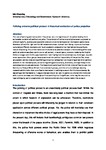Policing Extreme Political Protest: A Historical Evaluation of Police Prejudice
| dc.contributor.author | Channing, Iain | |
| dc.date.accessioned | 2018-03-22T10:46:10Z | |
| dc.date.issued | 2018-02-22 | |
| dc.identifier.issn | 1752-4512 | |
| dc.identifier.issn | 1752-4520 | |
| dc.identifier.other | pay010 | |
| dc.identifier.uri | http://hdl.handle.net/10026.1/11152 | |
| dc.description.abstract |
<jats:title>Abstract</jats:title> <jats:p>The task of policing political activism frequently tests the legitimacy of the police leaving them vulnerable to claims of political prejudice. The principle of police neutrality has been subjected to criticism by MPs, activists and academic scholars since the formation of the modern police force. Members of both far right and far left movements have claimed their liberty to protest has been curtailed at different moments and much academic scholarship has highlighted the pro-fascist nature of policing. This article redresses the balance to provide a deeper understanding of the way political activism was (and continues to be) policed. In recent years, protests involving the English Defence League and the Occupy movement have highlighted the contemporary challenges to public order operations. Both groups have questioned the political impartiality of the police. Yet, these accusations are not new and by offering a historical comparison to the policing of extreme political activism in the interwar years, concerns regarding police culture, discretion, and legitimacy in the contemporary era are addressed. The inconsistent policing of the British Union of Fascists and the Communist Party of Great Britain frustrated both groups, and this article challenges existing research which claims that a pro-fascist motivation in policing accounts for this inconsistency. By exploring other motivations, it argues that we should not see the police as a monolithic institution with a particular view, and although political partiality is still significant, other key factors such as legal ambiguity, police pragmatism and regional variations must also be taken into account.</jats:p> | |
| dc.format.extent | 900-915 | |
| dc.language | en | |
| dc.language.iso | en | |
| dc.publisher | Oxford University Press (OUP) | |
| dc.title | Policing Extreme Political Protest: A Historical Evaluation of Police Prejudice | |
| dc.type | journal-article | |
| dc.type | Journal Article | |
| plymouth.issue | 4 | |
| plymouth.volume | 0 | |
| plymouth.publication-status | Published | |
| plymouth.journal | Policing | |
| dc.identifier.doi | 10.1093/police/pay010 | |
| plymouth.organisational-group | /Plymouth | |
| plymouth.organisational-group | /Plymouth/Faculty of Arts, Humanities and Business | |
| plymouth.organisational-group | /Plymouth/Faculty of Arts, Humanities and Business/School of Society and Culture | |
| plymouth.organisational-group | /Plymouth/REF 2021 Researchers by UoA | |
| plymouth.organisational-group | /Plymouth/REF 2021 Researchers by UoA/UoA18 Law | |
| plymouth.organisational-group | /Plymouth/Research Groups | |
| plymouth.organisational-group | /Plymouth/Research Groups/Institute of Health and Community | |
| plymouth.organisational-group | /Plymouth/Users by role | |
| plymouth.organisational-group | /Plymouth/Users by role/Academics | |
| dcterms.dateAccepted | 2018-02-05 | |
| dc.rights.embargodate | 2020-2-21 | |
| dc.identifier.eissn | 1752-4520 | |
| dc.rights.embargoperiod | 24 months | |
| rioxxterms.versionofrecord | 10.1093/police/pay010 | |
| rioxxterms.licenseref.uri | http://www.rioxx.net/licenses/under-embargo-all-rights-reserved | |
| rioxxterms.licenseref.startdate | 2018-02-22 | |
| rioxxterms.type | Journal Article/Review |


